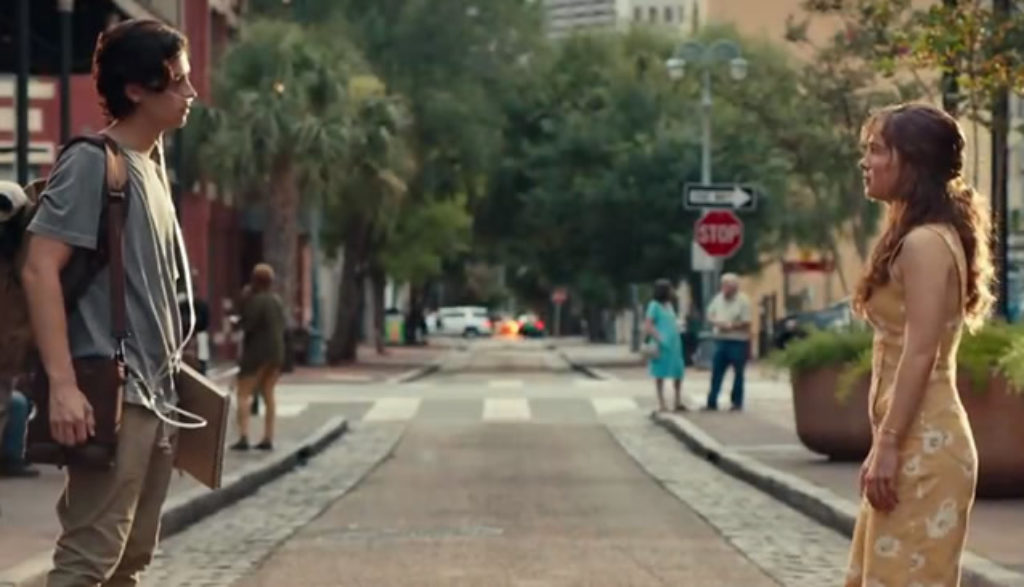
“We need that touch from the one we love, almost as much as we need air to breathe.” That’s what Stella wants, more than anything in the world. Both of those things, in fact: to touch, to breathe. But both are very difficult for Stella.
Since she was a little girl, Stella has roamed the halls and visited countless rooms in St. Grace Regional Hospital. Born with cystic fibrosis, a life-threatening genetic disorder, Stella is biding her time waiting for a lung transplant.
And like any normal teenager, she also wants to live her life—which has proven very difficult. Daily exercise, myriad medications and rigorous regimens fill Stella’s waking hours at the hospital. And if her routine wasn’t hard enough, she’s not allowed to touch other patients with cystic fibrosis if she wants to live.
It can be hard to stay positive. Which is why Stella has created her own YouTube channel, sharing the ups and downs of her disorder in an attempt to educate her viewers. But not everyone is as positive as Stella.
Will, a fellow patient at St. Grace who also has cystic fibrosis, isn’t really sold on the idea of taking his meds and following doctors’ orders. He’s of the mind that all that “junk” won’t do much but extend his suffering until he finally dies. That is, until he meets Stella.
Determined, organized and practical, Stella agrees to hang out with Will if he’ll follow the treatment schedule she plans for him. The only real requirement is that the two maintain their distance—five feet apart at all times. But what begins as an obligation turns into a deep love, one that’s fueled by hope—a hope that fights to just keep breathing.
Throughout the film we see Stella, Will and another cystic fibrosis sufferer named Poe struggle to maintain positivity and hope as the disease ravages their bodies. Will, in particular, often feels that his medication and treatment are only prolonging the inevitable. But when he meets Stella, he finds a new source of strength and hope as she forces him to care for himself.
Stella begins helping Will with his daily medical regimen. She encourages him to take his medication, to do his exercises and to follow all the guidelines that have been set by his doctor. Will, in return, speaks life into Stella, affirming her beauty, intelligence and worth. He also teaches Stella how to relax and have fun. The two form an emotional bond, fall in love and learn to be vulnerable in some healthy ways.
Through the lives of Will, Stella and Poe, we learn what it means to forgive others and to accept forgiveness yourself. Stella tends to blame herself for the bad things that happen in her life; but her friends, and the medical staff around her, reassure her that there are things beyond her control that she simply isn’t responsible for.
We see the value in maintaining positivity and cherishing every moment with those we love, because no one is promised tomorrow. We also learn that human touch and intimacy are crucial to flourishing. Each of the characters learns to find hope and joy in hopeless, tragic situations as they practice loving one another well in word and deed. One girl in particular lives her life to the fullest and promises to “live big” because Stella can’t.
Stella has a picture on her door which represents the mind, body and soul. She reads a book titled Life, Death & Immortality and tries to meditate daily.
Will and Stella make it clear that they’d like to kiss and have sex. But because of their condition, they have to settle for holding hands. In one scene, Stella tells Will she’s a virgin and that she’s scared to show a man her scarred body. She takes off her dress in front of him (we see her bra and underwear) and he strips down to his boxers. After a long gaze, the two swim together.
Will lets his friends use his hospital room when he’s not there to have sex. We don’t see anything, but characters have multiple conversations and make jokes about enjoying sex, “using protection” and foreplay. Poe, Stella’s best friend, is openly gay. He talks about his sex life with multiple guys, loving his boyfriend and jokes about not liking “white boys.”
Although there is nothing sexual about the care that Stella and Will receive, we do see her scarred stomach as nurses clean her wounds. Similarly, Stella washes her hands in her bra and underwear. Stella wears a dress she deems “see through,” though only her bra straps are visible.
A group of young women discuss which type of bathing suits are “too trampy” or too modest. Another wears a cleavage-baring top. A couple is briefly shown kissing.
We hear that a teen girl breaks her neck and drowns while cliff diving. A young woman falls through ice and nearly drowns. A boy collapses on a hospital floor and dies. A guy performs CPR on a girl. A nurse admits to letting two cystic fibrosis patients break hospital rules, which eventually led to their death.
Will draws a sketch of a grim reaper. Will, Stella and Poe have discussions (and make jokes) about what it would be like to die from their disease.
God’s name is misused four times, once paired with “d–mit.” The f-word is heard twice and the s-word six times. Other profanity includes one or two uses each of “b–ch,” “d–n,” “h—,” “d–mit” and “a–hole.” A guy jokingly calls a girl a “hoe.” A girl says “screw him.” A teen uses a crude hand gesture.
Teens drink champagne at a dinner party. Stella deals with the disorienting aftereffects of anesthesia following surgery.
Will is a rulebreaker, one who has lost hope when it comes to his life and treatment. He generally doesn’t follow his daily care schedule, and he treats life with flippancy (though this changes by the end of the film).
Stella’s grieves her parents’ divorce and blames herself for the death of a close friend—all of which she unfairly attributes to her illness. She struggles with control issues, labels herself “clinically OCD” and has difficulty getting close to some people.
A guy makes a joke about using suppositories. A teen vomits and spits up mucus.
There’s a power in love and human connection. We all crave intimacy, even if we don’t know it. We desire to be known—not just for who we are on the outside, but for who we are within. As Stella says, “Life’s too short to waste a second.” So we must invest in our relationships on this earth while we have the chance.
Stella and Will fight for deep connection throughout the entire film. Often their fight is against a real, tangible fear as they strive to maintain hope while battling a disorder that promises a short life. We see the two of them, along with friends, family and medical staff, persist in difficult times, love in word and deed, and reach for joy.
But although their actions and attitudes are often altruistic and admirable, there are aspects of this film that are not. Conversations about physical intimacy (including some about same-sex relationships) turn up, as well as multiple jokes about premarital sex. Language can be harsh, especially the film’s two gratuitous f-words. We also listen in on a number of melancholy conversations about death and mortality; they’re honest discussions, to be sure, but grim nonetheless.
Five Feet Apart is both beautiful and hopeful, problematic and tragic—especially for younger viewers. Yes, there are a lot of positive themes here. But there are also elements that might have you keeping your own viewing distance.
Be sure to read our review of the book connected to this movie: Five Feet Apart.


Kristin Smith joined the Plugged In team in 2017. Formerly a Spanish and English teacher, Kristin loves reading literature and eating authentic Mexican tacos. She and her husband, Eddy, love raising their children Judah and Selah. Kristin also has a deep affection for coffee, music, her dog (Cali) and cat (Aslan).
Our weekly newsletter will keep you in the loop on the biggest things happening in entertainment and technology. Sign up today, and we’ll send you a chapter from the new Plugged In book, Becoming a Screen-Savvy Family, that focuses on how to implement a “screentime reset” in your family!